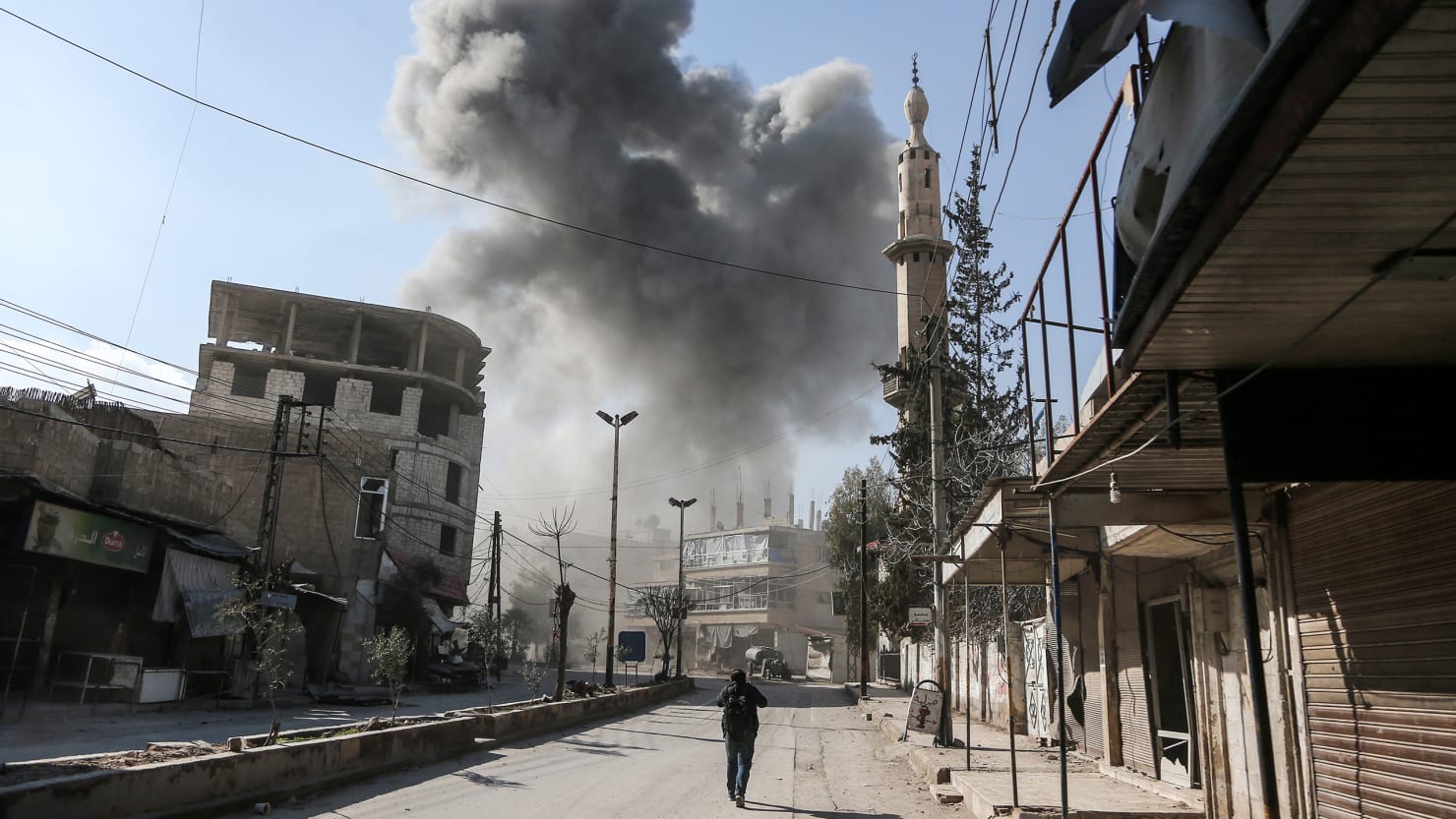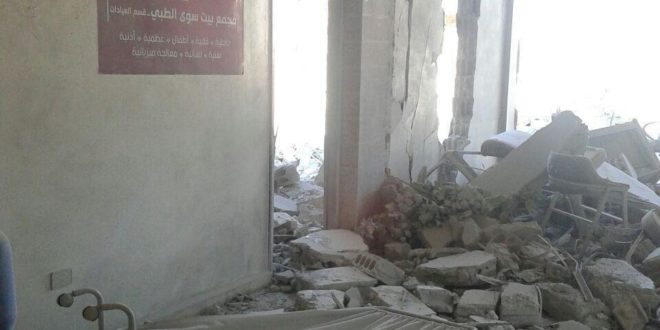
'The words “de-escalation zone” appear not to mean quite the same thing in Russian as they do in English.
That, at least, is a conclusion one might draw looking at the present scene in Syria’s East Ghouta, where the Russian air force has assisted its Syrian client regime in an enormous escalation of what was already an extremely high level of violence in the district on the eastern fringe of Damascus that has been under choking siege for five years, and was also the site of the infamous August 2013 Sarin gas attack that killed over 1,000 in a single morning.
The numbers speak for themselves: more than 250 people were killed by Syrian and Russian air bombardment, and over 1,000 wounded, on Monday and Tuesday alone, according to the Associated Press. At least four field hospitals have been rendered inoperative by apparently deliberate targeting, according to the Syrian American Medical Society, a relief organization with medical staff currently on the ground in Ghouta.
The same goes for the sole bakery serving the estimated 350,000-400,000 starving residents of the besieged suburbs, per reports from local citizen journalists. Video footage released by the Syrian Civil Defense volunteer aid force, also known as the White Helmets, shows apocalyptic scenes of fireballs erupting on razed, dust-darkened streets as rescuers scour rubble for survivors; an instance of what they called a “double tap” air strike.
All this in an area Moscow pledged last September, in an agreement reached with Turkey and Iran, to keep peaceful and bloodless.
That was back then. The new plan, in the words of Russian Foreign Minister Sergei Lavrov, is to repeat the “experience of freeing Aleppo” in Ghouta, a reference to what was in fact the massive, indiscriminate air and ground campaign in late 2016 that ended with the expulsion of opposition fighters, along with thousands of civilians, from Aleppo to Idlib Province.
The last time the Aleppo “experience” happened, an official UN inquiry found it to have constituted a “war crime.” This time around, UNICEF could only issue a blank statement, explaining, “We no longer have the words to describe children’s suffering and our outrage.”
There is no doubt that, “on the humanitarian level, the situation is catastrophic,” said Orwa Khalife, a Syrian journalist and analyst who has previously lived in Ghouta. “By hitting all of Ghouta’s infrastructure and vital points, such as hospitals, medical centers, and Civil Defense positions,” the regime and the Russians have “suspended the most basic and essential services” for civilians.
What is less certain is why this flare-up is happening now specifically, and what its ultimate outcome will be. According to Khalife, who writes regularly on military developments in Ghouta in the Arabic press, there have been a number of recent gains made by rebel fighters in the area that likely prompted the regime and its Russian patron to take decisive action to remove the mounting threat on the perimeter of the capital.
“The recent battle for the Vehicle Management Base [a strategic military vehicles base held by the regime] in Harasta put the regime in a tight spot, for it lost one of its most important military positions close to Damascus,” said Khalife.
“This loss was indicative of a general weakness in the regime army’s military striking force, and threatened it with the loss of further vital areas, which drove it to … focus on Ghouta, and try to tie it up militarily [and] impose an agreement on the opposition factions there.”
That hypothetical agreement, assuming it were modeled on the Aleppo example, as Lavrov suggests, would potentially involve “the removal of the opposition factions, or at least the surrendering of their heavy weapons,” and perhaps their displacement to Idlib or Daraa Provinces, Khalife added.
Of course, whether the leaderships of the opposition factions in Ghouta would agree to such a proposal is another matter. The symbolism of a total opposition defeat in Ghouta; one of the first regions to rise up against the regime in 2011, and the last stronghold of the rebellion in the capital’s vicinity; would be immense. Moreover, the numbers involved—of both fighters and civilians—are of an altogether higher magnitude than was the case in Aleppo.
“To forcibly displace Ghouta would be tantamount to ending the revolution,” said Baraa Abd al-Rahman, a Syrian journalist currently present in Ghouta.
“And it’s not easy to get rid of Ghouta’s revolutionaries, as we saw in recent months, when there was a campaign by the regime to take over Jobar, in Damascus, that lasted six months without success for the regime.
“So, no, I think applying the Aleppo scenario in Ghouta is impossible.”
For his part, Khalife thinks it is theoretically conceivable, “in the event that international pressure doesn’t lead to a suspension of the military campaign,” but it would still be considerably more complicated than the Aleppo precedent.
“There are essential differences [with Aleppo]. In Ghouta, the number of opposition fighters is greater, and the fighting fronts have been clear and continuous for years, which has allowed the development of wider military defense mechanisms” on the opposition’s part.
“Moreover, Ghouta contains between 350 and 400 thousand civilians, a large proportion of whom are wanted by the regime.” Such numbers of people can’t simply be swept off in buses, as was the case with East Aleppo’s residents.
“So the regime and Russia are left with limited options.”
Limited options, perhaps. But, in the meantime, apparently unlimited freedom to act as they please.'
“And it’s not easy to get rid of Ghouta’s revolutionaries, as we saw in recent months, when there was a campaign by the regime to take over Jobar, in Damascus, that lasted six months without success for the regime.
“So, no, I think applying the Aleppo scenario in Ghouta is impossible.”
For his part, Khalife thinks it is theoretically conceivable, “in the event that international pressure doesn’t lead to a suspension of the military campaign,” but it would still be considerably more complicated than the Aleppo precedent.
“There are essential differences [with Aleppo]. In Ghouta, the number of opposition fighters is greater, and the fighting fronts have been clear and continuous for years, which has allowed the development of wider military defense mechanisms” on the opposition’s part.
“Moreover, Ghouta contains between 350 and 400 thousand civilians, a large proportion of whom are wanted by the regime.” Such numbers of people can’t simply be swept off in buses, as was the case with East Aleppo’s residents.
“So the regime and Russia are left with limited options.”
Limited options, perhaps. But, in the meantime, apparently unlimited freedom to act as they please.'

No comments:
Post a Comment